“How filming Saving Private Ryan shook an Irish beach”, BBC News
Chris Andrews, BBC News NIShare, 5 June 2024
Tom Hanks joined the film’s other stars in a boot camp pre-filming
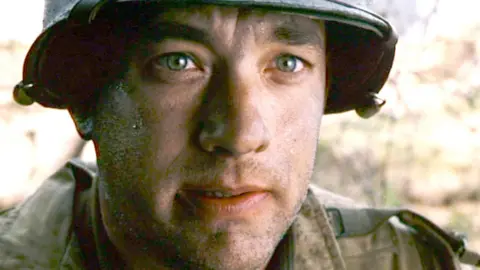
“Most of the explosive charges on that beach were real, so when they went off the beach shook.”
In 1997, the usually peaceful Curracloe Beach in County Wexford was transformed into a scene of bloodshed and horror as Steven Spielberg recreated D-Day in Ireland.
Saving Private Ryan was released to critical and veterans’ acclaim for how it depicted the American assault on Omaha Beach.
The story followed the mission of Cpt John Miller, played by Tom Hanks, who was tasked with locating James Francis Ryan, a private whose three brothers had been killed in action.
Normandy beaches ruled out
Northern Ireland filmmaker Mark Huffam was Saving Private Ryan’s unit production manager and associate producer.
He said the sights and sound of that iconic beach scene, more than 20 minutes in length, were “terrifying” to witness.
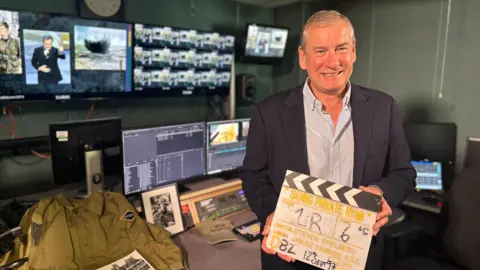
“The brief from the get-go was: ‘We want to make this look real’,” Huffam told BBC News NI.
“We’re not out to glamorise war, we want it to look like what those soldiers and men really went through when they hit that beach.”
This meant only three special effects were used in the sequence, with real explosions and fire.
Some eight cameras were rolling at once, capturing the emotions of Hanks’ character as he watched the deaths of comrades unfold in a barrage of machine gun bullets, shells and sniper fire.
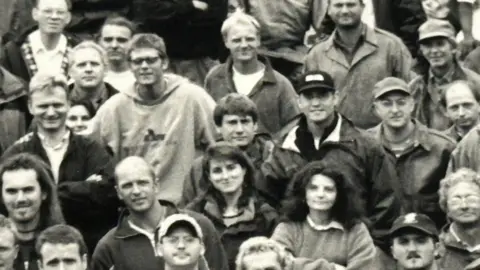
Normandy was considered as a filming location but quickly ruled out, Huffam explained, due to post-war development along the coast.
Instead, after an extensive search, Curracloe was chosen as its beach gradient allowed the landing craft to come ashore.
Huffam said much of the planning for the film, which took less than 60 days to shoot, was in Spielberg’s mind.
Meeting him for the first time on board a minibus, he said the crew was “always running to keep up with him”.
“We used to every night fax him about 150 questions and you’d come in the next morning and there would be a succinct answer to every single one of them,” he explained.
“All the departments would collate the questions they needed answers on: how many soldiers were we going to have in this scene, are they going to be Airborne Division or are they going to be paratroopers, how many Germans are there going to be?”
What was D-Day?
D-Day was the first day of the invasion of Normandy – the beginning of a huge campaign by the Allies of World War Two in north-west Europe, which was occupied by Nazi Germany.
Along with campaigns elsewhere – including the Eastern Front and the Italian campaign – it would eventually lead to Germany’s defeat.
The “D” in “D-Day” simply means “day” – it is a military term used to mark the start of an operation. The hour of attack was known as H-Hour.
Allied troops – mainly from the United Kingdom, Canada and the United States but also other countries – landed on five beaches in Normandy on 6 June.
The Allies suffered about 10,000 casualties – including an estimated 4,000 deaths – but the operation was a success.
Omaha D-Day recreation
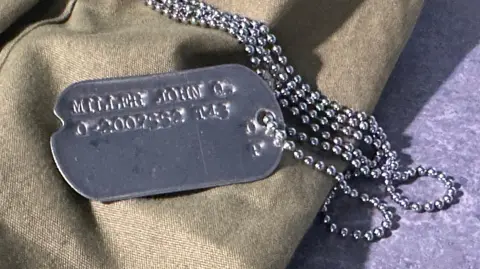
Such was the attention to detail that Irish army reservists, drafted in as extras, had to be signed off as competent swimmers, while ex-Royal Marines piloted the landing craft.
These were sourced from Palm Springs in the US, Southampton and two closer to home, from County Donegal.
Hanks and other stars were also made to attend a boot camp to “be trained into soldiers in two weeks”.
This involved “with no exceptions”, learning how to fire a machine gun, sleeping under canvas and eating rations.
“They occasionally did try and slip out up to the production office and see if they could scrounge some cooked chicken rather than having to cook it themselves,” Huffam revealed.
He added hundreds of gallons of food dye was used to turn Curracloe’s water blood red, while about 600 crew members stood ready, from stunt teams to fire safety.
This helped to set the tone for recreating Omaha, which witnessed more than 2,000 casualties on D-Day.
During his research Spielberg had spoken to US veterans about their experiences.
Hanks learned Saving Private Ryan lines from helmet
The Irish lighthouse keeper who gave D-Day the go-ahead
The American D-Day soldiers who left messages in a castle
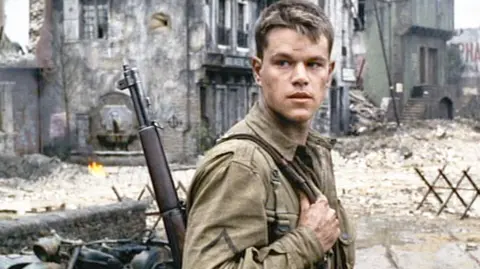
Huffam has gone on to work on other major productions such as Game of Thrones, Napoleon and The Martian.
When speaking to BBC News NI he brought along a clapper board, dog tag and Ranger Battalion jacket he kept from the set of Saving Private Ryan.
At one stage he owned one of the landing craft.
80th D-Day anniversary
He reflected that Spielberg’s standard was “it has to be accurate”, even if it is difficult to fully depict what the real-life experience must have been.
“How do you get off that landing craft and into a hail of machine gun fire and shells landing all around you?” Huffam questioned.
“How are you brave enough to do that?”
“I think it is terrifying, even when you know you’re doing it purely for a film.”
The feeling after each day on set, he added, was: “Oh my God, we pulled that off.”
He added: “The first time I saw it on a big screen I thought: ‘Wow’.”
The wartime epic won five Academy Awards, including best director.
Special commemorations are being held to mark the 80th anniversary of D-Day this month.